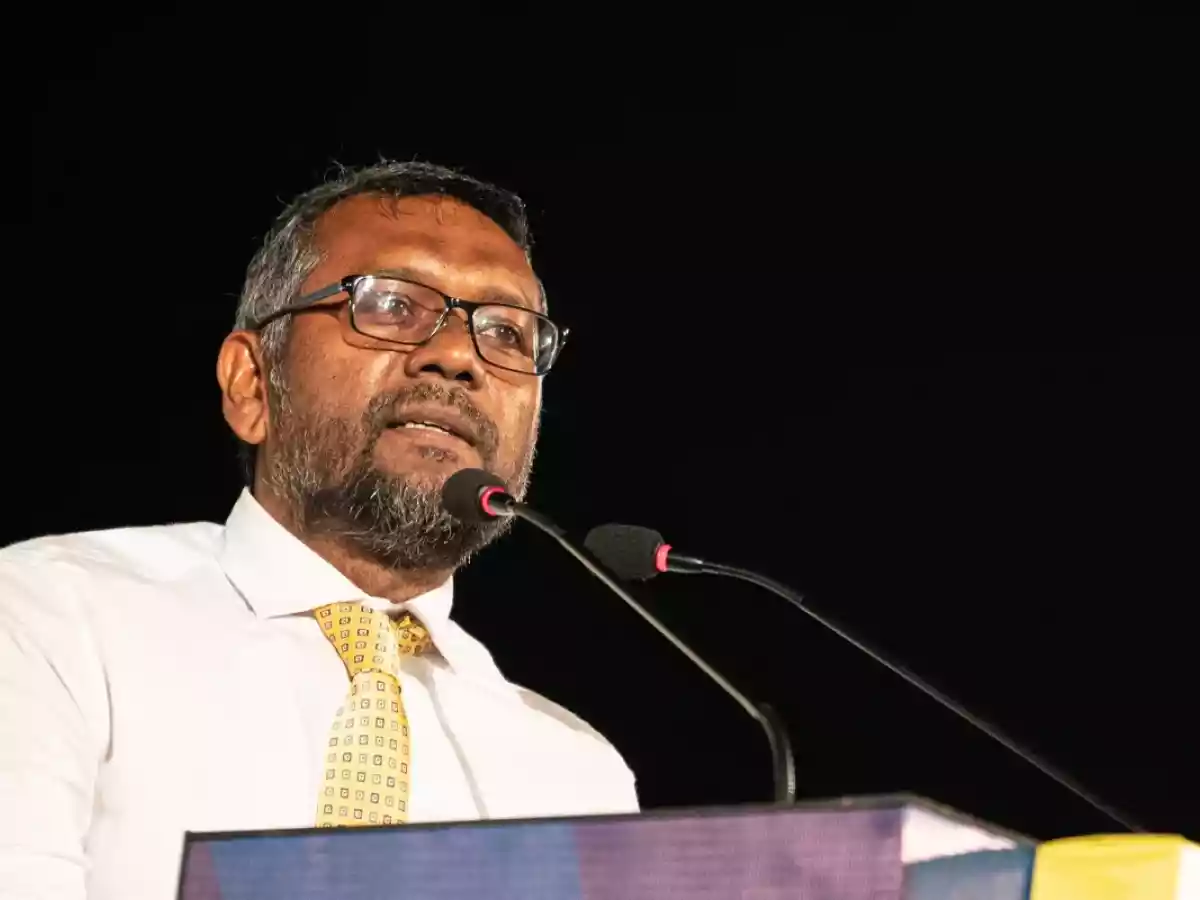
In the heart of the Indian Ocean, the Maldives faces suspicion as the Maldivian Democratic Party (MDP) raises concerns about a major agricultural project on Uthuru Thila Falhu Island, awarded to a Chinese company. MDP Chairperson FayyazIsmail suspects the project has ulterior motives, alleging that the Chinese are pursuing military objectives rather than genuine agricultural development. This skepticism gains traction when contrasted with President Muizzu’s recent decisions, seen as favoring Chinese interests at the expense of regional stability and partnerships, evident in reduced Indian presence. The project’s proximity to a Maldivian military harbor further fuels suspicions of its military nature, potentially benefiting a distant power.
The claim has been made at a time when President Muizzu has been actively working to reduce Indian involvement in the country. Since assuming office in November of the preceding year, Muizzu has made several decisions that are seen as unfavourable towards ties with India, thereby giving China more opportunities in the Indian Ocean Region. According to reports from psmnews.mv on March 3, Maldives President Mohamed Muizzu declared that all Indian troops currently stationed in the country would be withdrawn by May 10.
Earlier, in February, a Chinese ‘research’ vessel called Xiang Yang Hong 03 entered the waters of the Maldives and planned to dock in the capital city, Male. The 4,300-ton ship is designed for ocean floor mapping. The vessel, which belongs to a Chinese oceanography institute, had sailed from Sanya, China over a month ago and seeks to map the seabed, prospecting for minerals. However, security experts suspect that it could be an early reconnaissance vehicle, to explore possibilities of submarine operations in the strategically important Indian Ocean region.
Since assuming office in November of the previous year, President Muizzu, who is viewed as having pro-China inclinations, had requested India to withdraw its troops from Maldives. Initially, eighty-eight Indian military personnel, operating two helicopters and a Dornier aircraft, were providing humanitarian and medical evacuation services in Maldives. After a high-level meeting in New Delhi between the two countries, India consented to replace its military personnel operating the three aviation platforms in the Maldives by May 10.
At the same time, following an initial visit to China in January, Muizzu permitted a Chinese research vessel to dock in Male. There were concerns at the time that the vessel might be involved in mapping the seabed of the Indian Ocean, a strategically significant area where Indian security is at stake.The Maldives assured that the visiting ship would only be there for crew changes and supplies, and wouldn’t conduct any research. However, India was concerned about the ship’s activities beyond the Maldives. The ship has been charting a winding path between the Maldives and Sri Lanka, which could be a way to map the underwater regions for potential military use, like submarine deployment.
Meanwhile, the Maldives Industrial Development Free Zone (MIDF), a government agency, signed an agreement with China Harbor Engineering on March 28th. This agreement involves a large-scale agriculture project on Uthuru Thila Falhu, a northern island near India.
MIDFZ is a consortium comprising five state-owned enterprises. The memorandum of understanding (MoU) signed by MIDFZ sets the stage for the development of necessary infrastructure and resources aimed at enhancing agricultural production and revitalizing the agricultural sector, as reported by STO. The initiative represents an ambition to reverse the historical dependence of Maldives on imports. The project was conceived with the objective to provide local farmers with access to modern agricultural techniques, creating job opportunities and promoting growth in the mariculture and aquaculture industries.
The agreement aims to enhance food safety and ensure a consistent food supply while also tackling barriers to economic growth. It includes initiatives to boost investment in the agriculture sector, such as reclaiming land and constructing vital infrastructure for a new agricultural economic zone. The Chinese company, CHEC, will be responsible for building facilities for agriculture, industry, and transportation, as well as establishing specialized farms for fruits and vegetables and a farmer training center. However, concerns arise due to the timing and location of the project. The Maldivian opposition suspects that the true motive behind CHEC’s involvement may not be agricultural development but rather military purposes. This suspicion is fueled by CHEC’s past involvement in projects like the Hambantota port in Sri Lanka, where China eventually gained control due to Sri Lanka’s inability to repay debts.
China Harbour Engineering Company Ltd (CHEC), a subsidiary of China Communications Construction Company (CCCC), is a global infrastructure builder known for its involvement in various civil engineering projects such as seaports, canals, roads, bridges, railways, airports, and industrial plants. However, its close ties to the Chinese military and government have sparked concerns about its true intentions several times in the recent past.
In 2021, the Asian Development Bank (ADB) disqualified CHEC and two other Chinese construction firms from bidding on a crucial airport expansion project in Nepal due to ethical violations. This move came after nearly 20 companies initially showed interest, but only four Chinese firms submitted bids, and two of them were blacklisted. The sanctions against these companies, including CHEC, have resulted in temporary bans, causing delays in the airport development.
Moreover, CHEC has faced scrutiny in other countries. In Sri Lanka, allegations emerged suggesting that CHEC financially supported Mahinda Rajapaksa’s presidential campaign in 2015, prompting calls for an inquiry. Although CHEC denied these claims, the controversy raised questions about its political influence and transparency.
The World Bank banned CHEC from participating in projects in Bangladesh due to bribery allegations, highlighting concerns about its business practices. The United States has also taken action against CHEC over its involvement in land reclamation projects to build military islands in the contentious South China Sea. These incidents collectively raise doubts about CHEC’s true motives and its role as a key player in global infrastructure.
Fayyaz Ismail, head of the opposition Maldivian Democratic Party (MDP) and former Economic Minister, strongly disagreed with the government’s decision regarding the development of the Uthuru Thilafalhu (UTF) area. The MDP views UTF as a potential future housing area to alleviate overcrowding in the capital, Male’. Ismail questioned the allocation of such a significant and potentially valuable plot for agriculture, particularly under the management of a Chinese company. He argued that utilizing other islands for agricultural purposes would be a more cost-effective solution, allowing UTF to fulfill its intended purpose of providing housing.
The quick pace of reallocation of the UTF islands raises further questions. In December, 2023, the Muizzu government put on hold development plans for it. This area was designated for housing by the previous administration led by President Solih. Their plan involved a social housing scheme offering land plots to eligible citizens of Malé City. This former administration had also been building a dockyard and harbour for the Maldives National Defense Force (MNDF) on UTF, and even planned to reclaim more land nearby. It is for Maldives now to decide its strategic priorities in the UTF islands area.
In conclusion, China’s intervention in the Maldives, especially in sensitive areas like agriculture and defense infrastructure, along with President Muizzu’s policies favoring Chinese interests over regional stability and partnerships, warrants critical scrutiny and proactive measures to safeguard the Maldives’ sovereignty, security, and strategic autonomy in the Indian Ocean Region.
- *Dr. Maheep is a leading analyst of International Relations and Global Affairs. He contributes articles on issues of utmost importance for Humanity.









